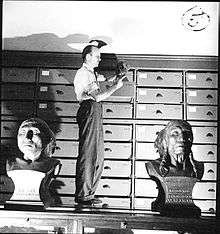Thomas Dale Stewart (anthropologist)
| T. Dale Stewart | |
|---|---|
 Photograph probably taken on October 3, 1950 by the Federal Bureau of Investigation | |
| Born |
June 10, 1901 Delta, Pennsylvania, U.S |
| Died |
October 27, 1997 (aged 96) Bethesda, Maryland, U.S |
| Nationality | American |
| Fields |
Forensic Anthropology Physical Anthropology |
| Institutions | Smithsonian Institution |
| Education |
Doctor of Medicine, 1931 Johns Hopkins University |
| Influences | Aleš Hrdlička |
Thomas Dale Stewart (June 10, 1901 – October 27, 1997) was a founder of modern forensic anthropology and a major contributor to most areas of human skeletal biology, paleopathology, and related areas of physical anthropology.[1][2][3] Stewart was known to have a more even temperament than his mentor, Aleš Hrdlička.[4]
References
- ↑ Pace, Eric (October 30, 1997). "T. Dale Stewart Dies at 96 - Anthropologist at Smithsonian". The New York Times. Retrieved October 20, 2015.
- ↑ Ubelaker, Douglas H. (2006). "Thomas Dale Stewart". Biographical Memoirs (PDF). 88. Washington, D.C: National Academy Press. pp. 352–367. ISBN 978-0-309-10389-3. Retrieved October 20, 2015.
- ↑ Ubelaker, Douglas H. (2012). "Contributions of T. Dale Stewart (1901–1997) to Paleopathology". In Buikstra, Jane; Roberts, Charlotte. The Global History of Paleopathology: Pioneers and Prospects. Oxford; New York: Oxford University Press. pp. 119–125. doi:10.1093/acprof:osobl/9780195389807.003.0015. ISBN 978-0-19-538980-7.
- ↑ Redman, Samuel J. (2016). Bone Rooms: From Scienctific Racism to Human Prehistory in Museums. Cambridge: Harvard University Press. ISBN 9780674660410.
External links
![]() Media related to Thomas Dale Stewart (anthropologist) at Wikimedia Commons
Media related to Thomas Dale Stewart (anthropologist) at Wikimedia Commons
This article is issued from Wikipedia - version of the 8/7/2016. The text is available under the Creative Commons Attribution/Share Alike but additional terms may apply for the media files.